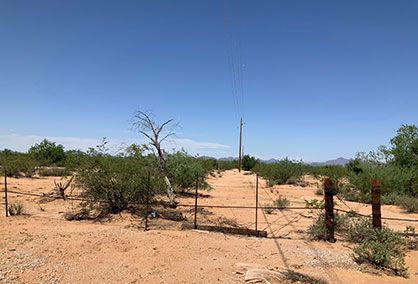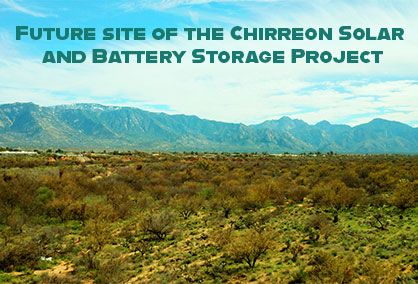Trico maintains reliability by managing trees and vegetation near our lines
You may see Trico employees or contractors trimming trees or pruning vegetation near Trico lines. We do this to prevent trees from contacting our lines, to provide our line crews with clear access to maintain the lines and to make repairs quickly during an outage.
Maintaining vegetation helps improve reliability in our system and reduce costly damage to our lines. When performing this work, we strive to respect our Members’ privacy and protect our beautiful natural surroundings.
We do this by working within easements and rights-of-way (ROW). These are property rights that authorize Trico to install and maintain our lines and perform clean-up work. It is vital for safety and reliability that these areas be kept clear. A well-maintained right-of-way makes visually identifying any down lines easy to locate, and it makes power restoration times shorter by not having to wrangle lines out of trees. The photo above is an example of a fence that prevents our staff from getting to Trico’s power poles. You can help us by not putting up fences, structures, trees or vegetation that block access within Trico’s easements and ROW.
One employee who plays a key role in protecting our lines is our Patrolman. Trico’s Patrolman monitors Trico’s service area to make sure the equipment is working properly and there are no obstructions, including fences, trees or other vegetation. You may see our Patrolman in the field, wearing a Trico uniform and performing this important work.
The overall goal of our vegetation management program is to provide reliable power to our Members while maintaining the beauty of our community. Proactive vegetation management benefits Members in three tangible ways:
Safety
First and foremost, we care about our Members and put their safety and that of our linemen above all else. Overgrown vegetation and trees pose a risk to power lines. For example, if trees are touching power lines in our Members’ yards, they can pose a serious danger. Electricity can arc, or jump, from a power line to a nearby tree. A proactive approach diminishes the chances of fallen branches or trees during severe weather events that make it more complicated and dangerous for linemen to restore power.
Reliability
Of course, one of the biggest benefits of a smart vegetation management program is reliability. Strategic tree trimming reduces the frequency of downed lines causing power outages. Proactive trimming and pruning keep lines clear to promote reliability.
We monitor our entire system and take extra steps in areas with heavy vegetation. For example, we rent a helicopter to monitor the line serving Mt. Lemmon.
Affordability
As you know, Trico is a not-for-profit cooperative, and that means we strive to keep our costs down to keep our rates affordable. This extends to our approach to vegetation management. If trees grow too close to power lines, the potential for expensive repairs also increases. Effective tree trimming and other vegetation management efforts keep costs down for everyone.
Our community is a special place. We appreciate the natural beauty and do our best to limit our impact on our Members, but we also know our community depends on us to provide reliable energy. Through vegetation management, we are better able to keep the power lines clear, prepare for future weather events and secure the reliability of the grid. If you are aware of any potential hazard near a Trico line, please contact Trico at 520-744-2944, and thank you for helping to keep easements and rights-of-way clear so we can continue to provide safe, reliable power in a cost-effective manner.

 SmartHub Log-in
SmartHub Log-in

